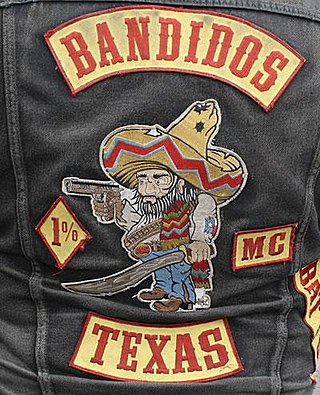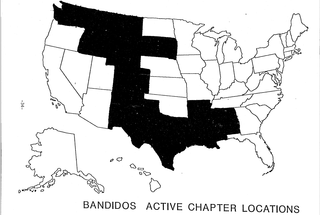
Pagan's Motorcycle Club, or simply the Pagans, is an outlaw motorcycle club formed by Lou Dobkin in 1957 in Prince George's County, Maryland, United States. The club rapidly expanded and by 1959, the Pagans, originally clad in blue denim jackets and riding Triumphs, began to evolve along the lines of the stereotypical one percenter motorcycle club.

An outlaw motorcycle club, known colloquially as a biker club or bikie club, is a motorcycle subculture generally centered on the use of cruiser motorcycles, particularly Harley-Davidsons and choppers, and a set of ideals that purport to celebrate freedom, nonconformity to mainstream culture, and loyalty to the biker group.

The Diablos Motorcycle Club is an outlaw motorcycle club founded in San Bernardino, California in 1961 that has chapters in cities across the United States.

The Mongols Motorcycle Club, also known as the Mongol Brotherhood or Mongol Nation, is an international outlaw motorcycle club. Originally formed in Montebello, California, in 1969, the club is headquartered in Southern California. Although the Mongols' main presence lies in California, they also have chapters nationwide in 14 states and internationally in 11 countries. Law enforcement officials estimate approximately 2,000 "full-patched" members are in the club. The Mongols are the fifth-largest outlaw biker club in the world, after the Hells Angels, the Bandidos, the Outlaws and the Pagans.
William "Billy" Queen Jr. is a retired undercover agent with the U.S. Bureau of Alcohol, Tobacco, Firearms and Explosives (ATF), and the author of the bestselling books Under and Alone and Armed and Dangerous.

The Sons of Silence Motorcycle Club (SOSMC) is an international outlaw motorcycle club. Founded in Niwot, Colorado in the United States in 1966, the club has a membership of over 250, with 35 chapters based in 12 U.S. states and in Germany. The Sons of Silence are the sixth-largest motorcycle club in the world, behind the Hells Angels, the Bandidos, the Outlaws, the Pagans and the Mongols.

The Vagos Motorcycle Club, also known as the Green Nation, is a one percenter motorcycle club formed in 1964 in San Bernardino, California. The club's insignia is Loki, the Norse god of mischief, riding a motorcycle. Members typically wear green.

The Highwaymen Motorcycle Club is a one-percenter outlaw motorcycle club. The club was formed in Detroit, Michigan in 1954. The club has undergone a number of large-scale police and FBI investigations, most notably in 1973, 1987 and 2007. In the early 1970s several members were convicted of bombings and raids of the homes and the clubhouses of rival motorcycle clubs.

The Devils Diciples Motorcycle Club (DDMC) is an outlaw motorcycle club that was founded in Fontana, California in 1967. Such clubs are not sanctioned by the American Motorcyclist Association (AMA) and do not adhere to the AMA's rules. The club originally had six members, there is a misconception that the word "disciples" was intentionally misspelled to distance themselves from any type of religion. However, in the early days of the club, some founding members went to Mexico to have their patches made, and the misspelling was unintentional, but stuck. Their insignia is a motorcycle wheel with two tridents crossing over it. In the United States, the club has chapters in Alabama, Arizona, California, Idaho, Illinois, Indiana, Michigan, Mississippi, Missouri, Nevada, and Ohio.

Numerous police and international intelligence agencies classify the Hells Angels Motorcycle Club (HAMC) as a motorcycle gang and contend that members carry out widespread violent crimes, including drug dealing, trafficking in stolen goods, gunrunning, extortion, and human trafficking operations. Members of the organization have continuously asserted that they are only a group of motorcycle enthusiasts who have joined to ride motorcycles together, to organize social events such as group road trips, fundraisers, parties, and motorcycle rallies, and that any crimes are the responsibility of the individuals who carried them out and not the club as a whole. Members of the club have been accused of crimes and/or convicted in many host nations.

The Red Devils Motorcycle Club (RDMC) is an international 1% outlaw motorcycle club and the principal support club of the Hells Angels. The club is not to be confused with the now-defunct Original Red Devils Motorcycle Club that was founded in Canada in the late 1940s. This club patched over to the East Coast based Bacchus in 2015.

The Bandidos Motorcycle Club is classified as a motorcycle gang by law enforcement and intelligence agencies in numerous countries. While the club has denied being a criminal organization, Bandidos members have been convicted of partaking in criminal enterprises including theft, extortion, prostitution, drug trafficking and murder in various host nations.

The Wheels of Soul Motorcycle Club are a multiracial one-percenter outlaw motorcycle club. Although they are active nationwide in the United States, they are primarily based in Philadelphia, Pennsylvania. With chapters in at least 25 states across the US, the group claims to be the country's largest mixed-race outlaw motorcycle club.
The Bandidos Motorcycle Club is classified as a motorcycle gang by law enforcement and intelligence agencies in numerous countries. While the club has denied being a criminal organization, Bandidos members have been convicted of partaking in criminal enterprises including theft, extortion, prostitution, drug trafficking and murder in various host nations.

The Dirty Dozen Motorcycle Club (DDMC) was an outlaw motorcycle club in Arizona. Founded in 1964, the Dirty Dozen became the preeminent motorcycle gang in the state, and ultimately merged with the Hells Angels in 1997.

The Hells Angels Motorcycle Club (HAMC) is designated an outlaw motorcycle gang by the Department of Justice. Based primarily in the Southwest, the Pacific Northwest, the Great Lakes region, the Mid-Atlantic and New England, there are an estimated 92 Hells Angels chapters in 27 U.S. states, with a membership of over 800. Due to the club's designation as a "known criminal organization" by the State Department and Department of Homeland Security, the United States has a federal policy prohibiting its foreign members from entering the country. The Hells Angels partake in drug trafficking, gunrunning, extortion, money laundering, insurance fraud, kidnapping, robbery, theft, counterfeiting, contraband smuggling, loan sharking, prostitution, trafficking in stolen goods, motorcycle and motorcycle parts theft, assault, murder, bombings, arson, intimidation and contract killing. The club's role in the narcotics trade involves the production, transportation and distribution of marijuana and methamphetamine, in addition to the transportation and distribution of cocaine, hashish, heroin, LSD, MDMA, PCP and diverted pharmaceuticals. According to the Federal Bureau of Investigation (FBI), the HAMC may earn up to $1 billion in drug sales annually.

The Bandidos Motorcycle Club has been designated an outlaw motorcycle gang by the U.S. Department of Justice. The club is involved in drug trafficking, weapons trafficking, prostitution, money laundering, explosives violations, motorcycle and motorcycle-parts theft, intimidation, insurance fraud, kidnapping, robbery, theft, stolen property, counterfeiting, contraband smuggling, murder, bombings, extortion, arson and assault. The Bandidos partake in transporting and distributing cocaine and marijuana, and the production, transportation and distribution of methamphetamine. Active primarily in the Northwestern, Southeastern, Southwestern and the West Central regions, there are an estimated 800 to 1,000 Bandidos members and 93 chapters in 16 U.S. states.

The Mongols Motorcycle Club is considered a motorcycle gang by law enforcement and intelligence agencies in various countries internationally. Mongols members have a long history in the illegal drugs trade, money laundering, robbery, extortion, firearms violations, murder, and assault, among other crimes. However, senior Mongols members as well as attorneys for the club deny that the group as a whole is a criminal enterprise and claim that the Mongols' bylaws prohibit criminals and drug users from being members.

The Outlaws Motorcycle Club, also known as the American Outlaws Association, or A.O.A., is classified as a motorcycle gang by various law enforcement agencies internationally. The Outlaws have been implicated in various organized crime activities, including drug trafficking, extortion, money laundering, prostitution rings, weapons trafficking, and violent acts directed at rival motorcycle clubs. Members of the Outlaws have continuously denied that the club is an organized crime syndicate, asserted that the organization is simply a group of motorcycle enthusiasts who live a nonconventional lifestyle, and described allegations by investigators and prosecutors as exaggerated.
Numerous police and international intelligence agencies classify the Hells Angels Motorcycle Club (HAMC) as a motorcycle gang and contend that members carry out widespread violent crimes, including drug dealing, trafficking in stolen goods, gunrunning, extortion, and prostitution rings. Members of the organization have continuously asserted that they are only a group of motorcycle enthusiasts who have joined to ride motorcycles together, to organize social events such as group road trips, fundraisers, parties, and motorcycle rallies, and that any crimes are the responsibility of the individuals who carried them out and not the club as a whole.
















